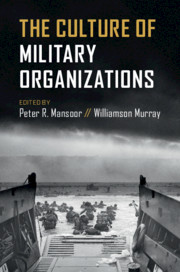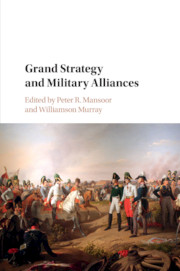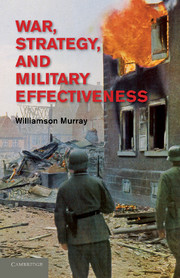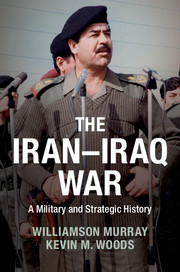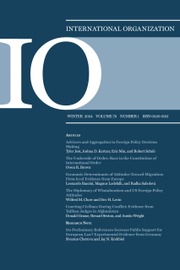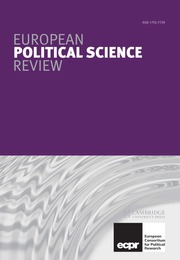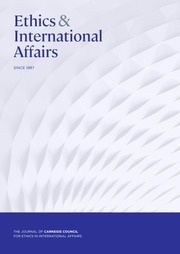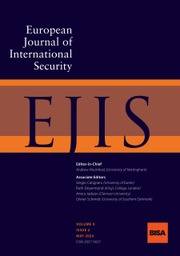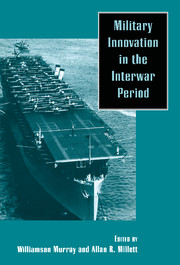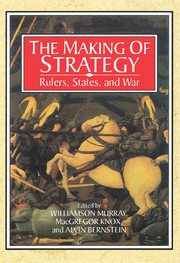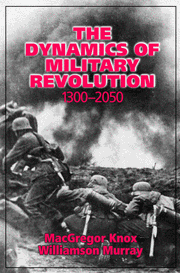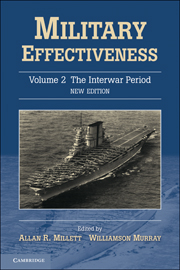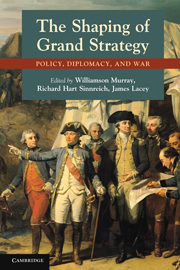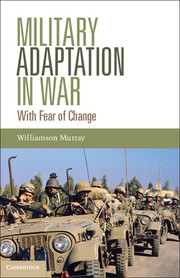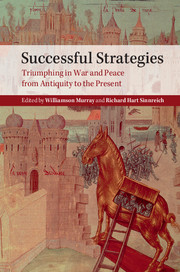The Culture of Military Organizations
- Editors:
- Peter R. Mansoor, Ohio State University
- Williamson Murray, Ohio State University
- Date Published: December 2019
- availability: In stock
- format: Paperback
- isbn: 9781108724487
Paperback
Other available formats:
Hardback, eBook
Looking for an examination copy?
This title is not currently available for examination. However, if you are interested in the title for your course we can consider offering an examination copy. To register your interest please contact [email protected] providing details of the course you are teaching.
-
Culture has an enormous influence on military organizations and their success or failure in war. Cultural biases often result in unstated assumptions that have a deep impact on the making of strategy, operational planning, doctrinal creation, and the organization and training of armed forces. Except in unique circumstances culture grows slowly, embedding so deeply that members often act unconsciously according to its dictates. Of all the factors that are involved in military effectiveness, culture is perhaps the most important. Yet, it also remains the most difficult to describe and understand, because it entails so many external factors that impinge, warp, and distort its formation and continuities. The sixteen case studies in this volume examine the culture of armies, navies, and air forces from the Civil War to the Iraq War and how and why culture affected their performance in the ultimate arbitration of war.
Read more- Presents new perspectives on how culture influences the effectiveness of military organizations
- Provides new insights as to why the US military, the most powerful in the world, failed to achieve its goals in Iraq and Afghanistan
- Examines in a historical context how culture has affected military organizations from the Civil War to the present
Reviews & endorsements
'The Culture of Military Organizations explains superbly the importance of military culture and clearly demonstrates how culture underpins the effectiveness of armed force. Culture, once formed, is difficult to change; it cannot always be ‘tamed,’ but it can and should be understood. This book makes an enormous contribution in helping to foster that understanding. The history is first-rate, the analysis incisive, and the conclusions of enormous value to military leaders and policy makers today.' General David Petraeus, US Army (Ret.), former commander of the surge in Iraq, US Central Command, and Coalition Forces in Afghanistan
See more reviews'A brilliant set of analyses of military cultures that captures the nature of military culture and an understanding of its importance. This is an important work written at a time when military innovation and transformation are being hotly discussed and debated. This is a must read for all those military leaders attempting to develop organizations that can meet the challenges posed by a new and different security environment.' General Anthony C. Zinni, United States Marine Corps (Ret.)
'The old Druckerism that ‘culture eats strategy for breakfast’ is aptly demonstrated in this erudite yet accessible book. Murray and Mansoor reveal how military culture eats strategy, operational logic and sound tactics in every war. Students of military history will revel in its insights and professors will find it chocked with invaluable lessons for the classroom.' Colonel Frank Hoffman, United States Marine Corps (Ret.)
'Invaluable perspectives on what may be the most important determinant of victory or defeat in war. Students of warfare and those responsible for military effectiveness will find important insights that not only impart understanding, but also illuminate ways to accentuate positive elements of military culture or compensate for deficiencies.' H.R. McMaster, Stanford University
‘The editors assembled a strong roster of contributors; there are no weak chapters as sometimes occurs in such works. Though the quality is uniformly good, the great strength of the cases is their diversity. There is a temporal balance with the late 19th, early and late 20th centuries represented in roughly equivalent parts.’ Col. J.P. Clark, ARMY Magazine
‘This volume makes a useful contribution to begin global historical explorations of military culture.’ Thomas Furse, Journal of Contemporary History
Customer reviews
Not yet reviewed
Be the first to review
Review was not posted due to profanity
×Product details
- Date Published: December 2019
- format: Paperback
- isbn: 9781108724487
- length: 482 pages
- dimensions: 227 x 152 x 26 mm
- weight: 0.68kg
- contains: 1 b/w illus. 3 tables
- availability: In stock
Table of Contents
1. Introduction Peter R. Mansoor and Williamson Murray
Part I. Theoretical Frameworks:
2. Culture and military organizations Leonard Wong and Stephen J. Gerras
3. Strategic culture David Kilcullen
Part II. Land Forces:
4. Ulysses S. Grant and the culture of the Union Army of Tennessee Wayne Wei-siang Hsieh
5. 'Playing a very bold game': the organizational culture of the Army of Northern Virginia, 1862–1865 Mark Grimsley
6. German Army culture, 1871–1945 Jorit Wintjes
7. The culture of the Indian Army, 1900–1947: an evolving identity Daniel Marston
8. An army apart: the influence of culture on the Victorian British Army Richard Hart Sinnreich
9. The culture of the British Army, 1914–1945 Williamson Murray
10. Imperial Japanese Army culture, 1918–1945: duty heavier than a mountain, death lighter than a feather David Hunter-Chester
11. Military culture, military efficiency, and the Red Army, 1917–1945 Reina Pennington
12. An army like no other: the origins of the IDF's military culture Gil-li Vardi
13. The weight of the shadow of the past: the organizational culture of the Iraqi Army, 1921–2003 Kevin M. Woods
14. US Army culture, 1973–2017 Peter R. Mansoor
Part III. Maritime Forces:
15. The Royal Navy, 1900–1945: learning from disappointment Corbin Williamson
16. US Navy cultural transformations, 1945–2017: the jury is still out John T. Kuehn
17. The US Marine Corps, 1973–2017: cultural preservation in every place and clime Allan R. Millett
Part IV. Air Forces:
18. The culture of the Royal Air Force, 1918–1945 David Stubbs
19. US Air Force culture, 1947–2017 Robert Farley
20. Conclusion Peter R. Mansoor and Williamson Murray.
Sorry, this resource is locked
Please register or sign in to request access. If you are having problems accessing these resources please email [email protected]
Register Sign in» Proceed
You are now leaving the Cambridge University Press website. Your eBook purchase and download will be completed by our partner www.ebooks.com. Please see the permission section of the www.ebooks.com catalogue page for details of the print & copy limits on our eBooks.
Continue ×Are you sure you want to delete your account?
This cannot be undone.
Thank you for your feedback which will help us improve our service.
If you requested a response, we will make sure to get back to you shortly.
×
